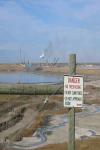Tar sands battle continues in California courts
InsideClimateNews | Jan 25, 2012
By Maria Gallucci
A high-stakes legal battle is underway in California over whether the state's clean air agency can enforce a first-ever rule to slash carbon emissions in transportation fuels. The fight is being closely watched because the rule could choke global market demand for Alberta's carbon-intensive oil sands at a very precarious time for the industry.


